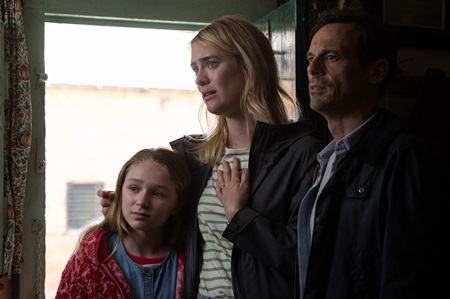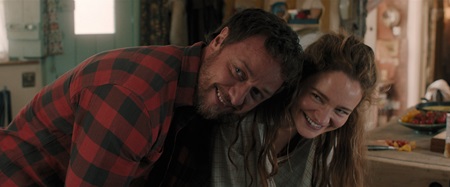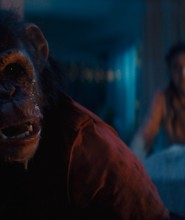
English Speak No Evil is an Audience-Friendly Reconstruction of the Bleak Dutch Original
It’s difficult to know how much to say about Speak No Evil and the playfully nimble way writer-director James Watkins attacks the material. Based on the extraordinarily bleak and unapologetically nihilistic 2022 Dutch masterwork directed and co-written by Christian Tafdrup, it is no spoiler that this thoroughly Americanized version does not pack the same sort of agonizingly depressive punch as its predecessor. But don’t hold this remake’s humor and Wes Craven-style slasher aesthetics against it. Just because this thriller has a different (and thoroughly unsurprising) ending, that does not mean its final images are at all comforting.
The problem? Talking about any of that — especially to those unfamiliar with the original version — is impossible. Heck, my saying Watkins goes for an entirely different climax than Tafdrup is revealing way too much as it is. The entire final act is where all the fireworks (as it should be) and all the interesting creative choices are, so not being able to chat about any of that makes reviewing this remake something of a chore.
The core scenario remains the same in both versions. While on holiday, a husband and wife with a young daughter make the acquaintance of another couple who have an adolescent child of their own, a son with a medical condition that makes verbal communication difficult for him. The former trio is invited to the latter’s secluded home anytime they’re looking to get away from the hustle and bustle of everyday life. When they take their new friends up on this offer, it becomes apparent something sinister is going on. Cue up the ominous music.
In Watkins’s take on the material, the traveling couple are American ex-pats living in London Louise Dalton (Mackenzie Davis), her husband Ben (Scoot McNairy), and their precocious daughter Agnes (Alix West Lefler, who is outstanding). The gregarious Brits who welcome them into their isolated rustic farmhouse with a pleasant smile (and maybe a cleverly concealed dagger) are retired doctor Paddy (James McAvoy), his much younger wife Ciara (Aisling Franciosi), and their jittery son Ant (Dan Hough).
Okay. As an audience, we know something is up with Paddy and his clan the second they introduce themselves to Louise and the rest of her family. That said, McAvoy and Franciosi are so gosh darn charming it’s easy to see how American newcomers with few friends and zero roots in the community could so easily fall under their magnetic spell. Both actors are superb, especially McAvoy (even if he is channeling his inner Split animal a bit too obviously).
Additionally, it helps that Davis and McNairy do an excellent job of revealing the growing fractures in Louise and Ben’s marriage without the aid of too much extraneous exposition. They are immediately believable as a couple trying to work things out under difficult circumstances, and this makes it easier to believe how willing they are (at least initially) to overlook some rather worrying signs emanating from Paddy and Ciara.
Considering Watkins made Eden Lake, one of the most aggressively desolate efforts of the 2000s, I doubt the overwhelming emotional darkness of Tafdrup’s outing gave him second thoughts about crafting an English version. What’s interesting, and yet hardly unexpected, is that he eschews the tensely unnerving wickedness of the original for something playfully macabre instead. The growing anxiety that made watching the Tafdrup version a mesmerizing tense of endurance does not exist here. This is neither a plus nor a minus. Instead, it’s just the way that it is. Make of that what you will.
But unlike, say, the climactic differences between the 1988 version of The Vanishing and its 1993 star-studded Hollywood remake (both directed by George Sluizer), the more audience-friendly aspects of what Watkins has composed for this new Speak No Evil do not feel forced, inorganic, or imposed upon the director by a major studio’s corporate boardroom. Because he’s littered his take with jolts of humor and allows so much of the investigative revelations to be instigated by the children and not their parents, that the finale owes more to the likes of Scream or The Purge than it does to something like Funny Games or the ’88 version of The Vanishing isn’t as big a deal as it could have been had things been in less competent directorial hands.
That does not mean Watkins has crafted a rowdy crowd-pleaser. If we’re comparing it to Tafdrup’s effort, a swift kick to the head, a punch to the gut, and stepping on a rusty nail while walking around barefoot would also be declared as being “crowd-pleasing.” But, make no mistake, Watkins is dissecting the almost viral power of evil to infect and consume everything it touches. As such, he closes events out on a haunting final image that suggests a different form of pain and suffering happening at a far-off point in an unknowable future, and I appreciated this ephemeral touch of sly Hitchcockian madness.
As good as that is, I still can’t claim that Watkins’s adaptation will have the everlasting disquieting resonance of the Dutch version. It also isn’t anywhere near as terrifying. But the cast is excellent, and the action is fast, furious, and suitably smothered in blood. This Speak No Evil may not sever the jugular, but it does leave a handful of cuts and bruises. Sometimes that’s enough. This is one of those times.
Film Rating: 3 (out of 4)








